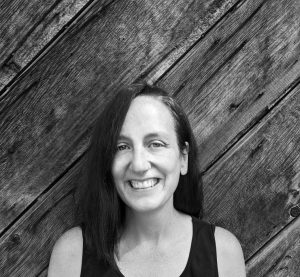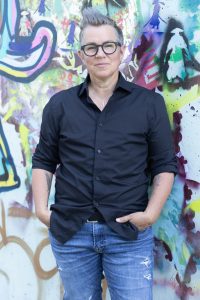
Andrea Emberly
Andrea Emberly is an ethnomusicologist and Associate Professor in the Children, Childhood & Youth program at York University. Her work focuses on the study of children’s musical cultures and the relationship between childhood, wellbeing, and musical arts practices. Her work intersects with music sustainability in terms of how children and young people access, innovate, and mobilize musical arts practices within their communities and beyond. She is currently working on several community-led collaborations with refugee and newcomer children and young people, community organizations, and refugee settlement agencies across the GTA and internationally. These projects explore how children and young people mobilize music and arts as a means to push-back against the silencing of children’s voices through processes of migration and displacement. These projects are committed to community-led knowledge mobilization, transforming the ways we use research with children and young people as a tool for change.
Project title: “Singing Our Stories Together: Supporting community-based music programs for equity-seeking young people through creative arts-based pedagogies.
 Kael Reid
Kael Reid
Kael has a PhD in Education from the University of Toronto. During their doctoral research, they investigated how songs composed and recorded from interviews conducted they with 2SLGBTQI+ families opened up dialogue with equity-seeking youth about gender, sexuality, embodiment, and relationships. Currently, Kael is a Postdoctoral Fellow and instructor in the Faculty of Liberal Arts and Professional Studies at York University where they are working on two arts-based research projects with newcomer and refugee young people. These projects examine how community music programs, songwriting, recording, performance, and other art-based activities enable newcomer and refugee youth to develop and extend their expressive skills, build connections and collaborative networks, and experience personal empowerment and wellbeing. As part of this research, Kael uses an innovative, participatory research creation method they developed called, “collaborative ethnographic songwriting.” A robust method for collecting, analyzing, and disseminating research data through music, collaborative ethnographic songwriting supports equity-seeking people to compose, record, and document their stories in song. Using this method, Kael has worked as an artist researcher on various research digital storytelling and research-informed theatre projects as well as with 2SLGBTQI+ individuals and families, breast cancer survivors, newcomer and refugee youth.
Kael is also singer-songwriter and whip smart wordsmith, and they’re sure to entertain. Slam-storytelling meets many a queer-themed tune in Kael’s songs, which just might have you rolling in the aisles with laughter or dabbing tears from your eyes. With five albums under their belt and a slew of singles, they perform at live music venues, music and Pride festivals, youth and arts conferences, universities, public schools, union meetings, and in people’s living rooms and back yards. Kael also combines musical activism with public pedagogy by facilitating workshops, giving concerts, and delivering musical keynote addresses for universities and colleges, secondary schools, and conferences, community service organizations.
pronouns: they/she
Postdoctoral Fellow
Faculty of Liberal Arts and Professional Studies
York University, Toronto, ON
kael@kaelreid.com
katereid@yorku.ca
Project title: “Singing Our Stories Together: Supporting community-based music programs for equity-seeking young people through creative arts-based pedagogies”
 Keisha Bell-Kovacs
Keisha Bell-Kovacs
Keisha Bell Kovacs is pursuing a Ph.D. in musicology with a focus on jazz studies through a lens of race and gender. She is a pianist, composer, and arranger and performs regularly with her trio in Toronto. She has arranged scores for York University’s Media Music Concert, which features a student-led wind ensemble. Keisha has had a lengthy career teaching Western art music theory, history, piano performance and pedagogy. She earned a master’s degree in composition in 2020 and released her first album, Caribbean Yellow in 2022. Her book review for Liner Notes for the Revolution was published in the MUSICultures journal in the fall of 2023, and she is a two-time recipient of the John Arpin Award for Fine Arts.
Project title: “Breaking Free: Investigating a Decolonized, Student-Centred Alternative to the Royal Conservatory of Music Piano Syllabus”

Stephen Carr is pursuing PhD studies in musicology and ethnomusicology at York University, with a research focus on expanding academic approaches to vocal performance pedagogy. He also teaches as a sessional lecturer at the University of Toronto’s School of Music and as a stagecraft specialist at the Royal Conservatory of Music in downtown Toronto.
Stephen spent eight years as an Associate Professor of Opera and Musical Theater Studies at the Eastman School of Music and Associate Artistic Director of Eastman Opera Theater. His productions at Eastman included Les Dialogues des Carmélites, which was awarded the American Prize for Stage Directing, and staged collaborations with composers Missy Mazzoli, Anthony Davis, Kevin Puts, Adam Guettel, and Jake Heggie. He has also served on the faculty of the Interlochen Arts Institute and the Senzoku Gakuen Conservatory of Music in Tokyo, where he helped to create one of the leading undergraduate musical theatre programs in Asia. You can learn more about his work at www.stephen-carr.net
Project title: “Decentering Western Art Music in the Training of Young Singers”
